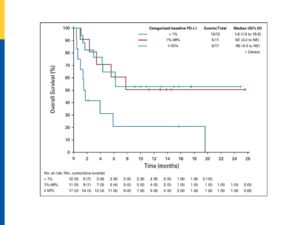Anaplastic thyroid cancer, a rare, even obscure cancer, is extremely lethal to those unfortunate enough to get it. Representing only a small fraction of thyroid cancers they are uniformly fatal no matter what is done to try to treat them. They invariably recur both in the neck and systemically. Death is often excruciating with choking off of the airway as the final event. That said, the advent of checkpoint inhibition as a concept in cancer treatment has reached this difficult disease. In the Journal of Clinical Oncology in May, 2020 is an article by Capdevila and colleagues from Barcelona, Spain, in which they used a new checkpoint inhibitor, Spartalizumab, to treat this disease. What they found was intriguing and promising. Click here for a link to the article. If you wish to see the entire article in PDF form, email Dr. Stark (form on the right) and he can send it to you. The accompanying graph shows their results.  What they found was a striking correlation between PD-L1 positivity and survival. PD-L1 level is a measure of how mutated the tumor is in blocking the immune response that would normally get rid of it. In most tumors that are PD-L1 positive there is no correlation between level of PD-L1 and benefit to this class of drugs. Amazingly here half the patients that showed high PD-L1 were alive at two years, and showed no signs of dying. Patients whose tumors were PD-L1 negative did miserably, as usual. Dr. Stark weighs in, “This is an oncologic home run in the treatment of this horrible disease. We await further developments. Stay tuned for a follow up.
What they found was a striking correlation between PD-L1 positivity and survival. PD-L1 level is a measure of how mutated the tumor is in blocking the immune response that would normally get rid of it. In most tumors that are PD-L1 positive there is no correlation between level of PD-L1 and benefit to this class of drugs. Amazingly here half the patients that showed high PD-L1 were alive at two years, and showed no signs of dying. Patients whose tumors were PD-L1 negative did miserably, as usual. Dr. Stark weighs in, “This is an oncologic home run in the treatment of this horrible disease. We await further developments. Stay tuned for a follow up.